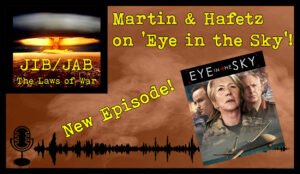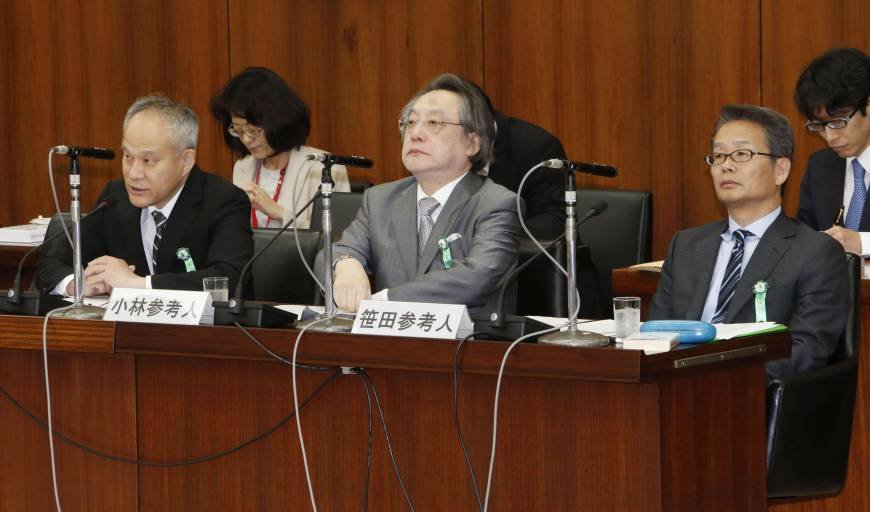 In the latest episode of JIB/JAB-The Laws of War Podcast, I have a cross-posted episode in which I am the guest of Jonathan Hafetz on his Law and Film Podcast to discuss the film Eye in the Sky. It is a 2015 film likely known to most JIB/JAB listeners, about a joint British and American drone strike against al-Shabaab terrorists in Kenya, and which intelligently and engagingly explores the legal, ethical, philosophical, political, and strategic issues raised by the operation. We not only examine the film’s treatment of the legal issues implicated, including whether IHL should apply at all, and how the principles of distinction, necessity, proportionality, and precautions in attack are illustrated in the film, but we also explore the relationship between these principles and some of the ethical and strategic aspects of the decision-making in the film. We round out the conversation with a discussion of some other engaging films that similarly explore law in the context of armed conflict. I very much enjoyed the conversation!
In the latest episode of JIB/JAB-The Laws of War Podcast, I have a cross-posted episode in which I am the guest of Jonathan Hafetz on his Law and Film Podcast to discuss the film Eye in the Sky. It is a 2015 film likely known to most JIB/JAB listeners, about a joint British and American drone strike against al-Shabaab terrorists in Kenya, and which intelligently and engagingly explores the legal, ethical, philosophical, political, and strategic issues raised by the operation. We not only examine the film’s treatment of the legal issues implicated, including whether IHL should apply at all, and how the principles of distinction, necessity, proportionality, and precautions in attack are illustrated in the film, but we also explore the relationship between these principles and some of the ethical and strategic aspects of the decision-making in the film. We round out the conversation with a discussion of some other engaging films that similarly explore law in the context of armed conflict. I very much enjoyed the conversation!
Media
Media Should Stop Legitimizing Abe’s Article 9 ‘Reinterpretation’
(Published in The Japan Times, Jun. 13, 2015).
Three of Japan’s preeminent constitutional law scholars testified on June 4 that the government’s recently tabled national security bills were unconstitutional. The proposed legislation is intended to implement the Cabinet resolution that purports to “reinterpret” the war-renouncing provision of the Constitution. The legal scholars’ testimony was greeted with apparent surprise in the media, as though it had not occurred to anyone until that moment that the draft bills might be unconstitutional.
The media reporting on the so-called reinterpretation has reflected a profound misunderstanding of the constitutional effect of the Cabinet resolution ever since it was issued last summer. The press has typically stated that the meaning of Article 9 had been “changed” or “revised” by the Cabinet resolution. That is simply wrong as a matter of law. It is important that the media understand that the Constitution was not amended or changed in any way by the Cabinet resolution, and that laws must continue to be judged against long established interpretations of Article 9. Otherwise, misleading and mistaken reporting on the issue could contribute to making an illegitimate attempt at reinterpretation a de facto amendment.
Time to Kill the Term ‘Officer-Involved Shooting’
(Published on the Huffington Post, May 26, 2015)
If you subscribe to the Facebook page of the organization “Killed by Police“, you will receive a depressing parade of daily updates on police shootings. This litany of posts drives home the fact that the police in the U.S. kill several people a day on average. But one will also notice that the media typically reports these killings as “office-involved shootings.”
Why has the media taken to reporting the shooting and killing of people by law enforcement this way? It is dangerously misleading. Moreover, it is not just the headline that employs such ambiguous language. Typically, the report goes on to explain that the person “died” as a result of the “officer-involved shooting.” This use of such euphemistic language to describe an incident in which an organ of the state has killed a citizen is not only bizarre, it should alarm us. As Orwell so eloquently explained in such essays as “Politics and the English Language” and “Writers and Leviathan,” such deliberately misleading and opaque use of language can pose a danger to the fabric of democracy. If we do not write clearly about our political system and public institutions, we will cease to think very clearly about them too.


